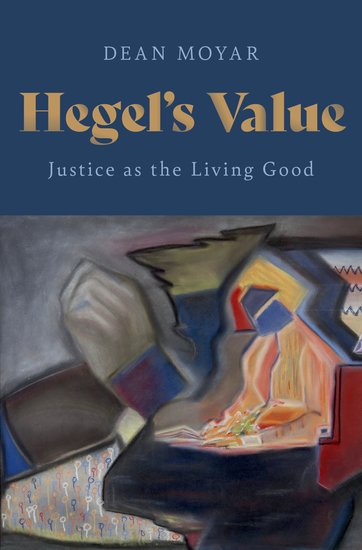We are very glad to give notice of the release of the book Hegel’s Value. Justice as the Living Good by Dean Moyar (Oxford University Press, 2021).
From the publisher’s website:
Hegel’s Philosophy of Right has long been recognized as the only systematic alternative to the dominant social contract tradition in modern political philosophy. Dean Moyar here takes on the difficult task of reading and representing Hegel’s view of justice with the same kind of intuitive appeal that has made social contract theory, with its voluntary consent and assignment of rights and privileges, such an attractive model. Moyar argues that Hegelian justice depends on a proper understanding of Hegel’s theory of value and on the model of life through which the overall conception of value, the Good, is operationalized.
Closely examining key episodes in Phenomenology of Spirit and the entire Philosophy of Right, Moyar shows how Hegel develops his account of justice through an inferentialist method whereby the content of right unfolds into increasingly thick normative structures. He asserts that the theory of value that Hegel develops in tandem with the account of right relies on a productive unity of self-consciousness and life, of pure thinking and the natural drives. Moyar argues that Hegel’s expressive account of the free will enables him to theorize rights not simply as abstract claims, but rather as realizations of value in social contexts of mutual recognition.
Moyar shows that Hegel’s account of justice is a living system of institutions centered on a close relation of the economic and political spheres and on an understanding of the law as developing through practices of public reason. Moyar defends Hegel’s metaphysics of the State as an account of the sovereignty of the Good, and he shows why Hegel thought that philosophy needs to offer an account of world history and reformed religion to buttress the modern social order.
***
TABLE OF CONTENTS
Introduction
1. Political Moralism and Critical Realism
2. An Overlooked Theory of Value
3. Hegel’s Teleological Inferentialism
4. Justice and the Living Institutional System
5. The Basic Argument
Chapter 1: Individual Right and the Living Ethical Order
1.1. Mutual Recognition and the Externalism of Modern Right
1.2. The Critique of Fichte and the Appeal to Life
1.3. Self-Consciousness and the Rationality of Life
1.4. The Emergence of Value in the Work of the Servant
1.5. The Tragedy of Immediate Justice
Chapter 2: The Inferences of Right
2.1. Free Spirit and Infinite Value
2.2. Expressively Valid Inferences of the Free Will
2.3. Immanent Development and the Basic Argument of Right
Chapter 3: Value in the Development and Conclusion of Abstract Right
3.1. The Purpose of Personality
3.2. Property Rights as Expressions of the Free Will
3.3. Value as the “true substantiality” of Property
3.4. Forms of Value as Types of Alienation
3.5. Contract and Inferential Equivalence Value
3.6. The Inferentialism of Crime and Punishment
3.7. Value in the Transition to Morality
Chapter 4: The Incorporation of Subjective Value into the Good
4.1. The Process and Purpose of Morality
4.2. The Deficient Practical Inference of the Deed
4.3. Objective and Subjective Value in Intentional Action
4.4. The Right of Necessity and the Transition to Universal Value
4.5. The Good as the Final Purpose of the World
4.6. Conscience and Reflective Equilibrium
Chapter 5: The Living Good
5.1. Sittlichkeit as the Just System of Value
5.2. The System of Practical Inferences
5.3. Ethical Mutuality and the Equivalence of Rights and Duties
5.4. How to Build a Living Institution
5.5. The Family as the Living Good
Chapter 6: The Circulation of Value in Civil Society and the State
6.1. Completing the Inference of Needs through Education
6.2. The Value of Work and the Division into Estates
6.3. The Return of the Good in “The Police and the Corporation”
6.4. Settling One’s Own Account with the State
6.5. The Living State as a Totality of Inferences
6.6. The Executive Branch and Governance “From Below”
Chapter 7: Law and Public Reason
7.1. Inferentialism and Processes of Law
7.2. Hegel’s Legal Positivism
7.3. The Contextualism of Justice and the Limits of Philosophy
7.4. The Court as the Prototype of Public Reason
7.5. Hegel’s Constitutionalism
7.6. Public Reason and Representative Interests
Chapter 8: The Sovereignty of the Good
8.1. Internal Sovereignty and the Justice of the Whole
8.2. External Sovereignty and Mutual Recognition between States
8.3. Purpose and Justice in History
8.4. Moral and Civil Religion
8.5. Liberation and Reconciliation
Printable Version


